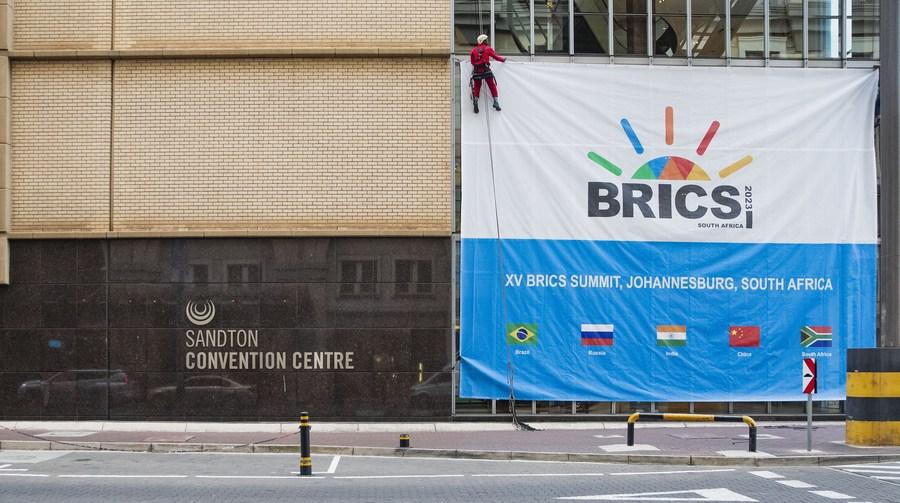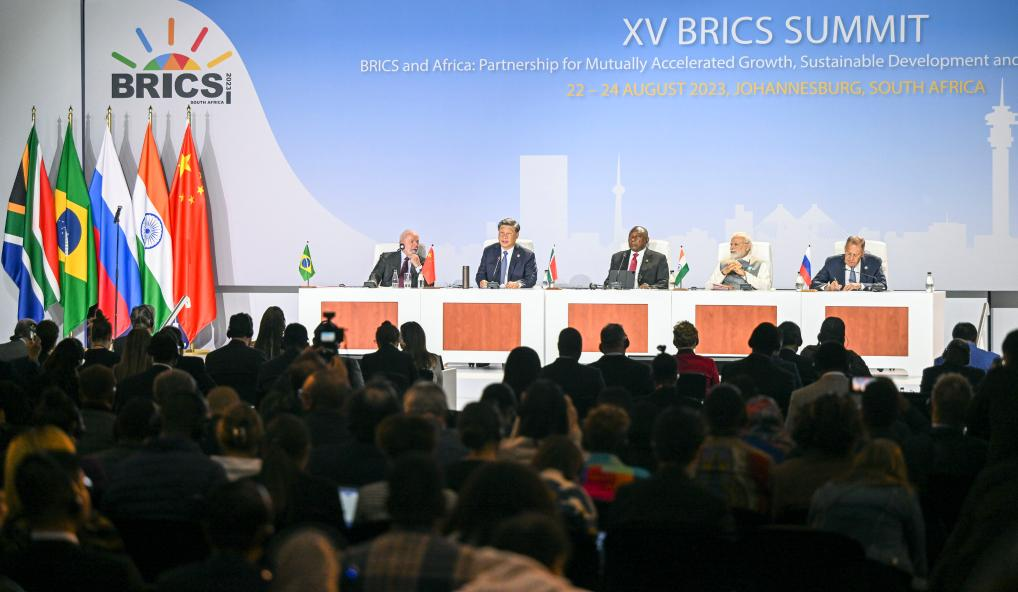
A signboard of the 15th BRICS Summit outside the Sandton Convention Center in Johannesburg, South Africa, August 17, 2023. [Photo/Xinhua]
By Mariam Shah
In a historic milestone, BRICS expanded its membership and welcomed six countries from different continents, but united on a similar agenda. This long-awaited expansion signifies a new era of multilateral cooperation, promising a more just global governance framework. The countries that have joined BRICS include Argentina, Egypt, Ethiopia, Iran, Saudi Arabia, and the United Arab Emirates. This is the first expansion of BRICS since South Africa joined the bloc in 2011.
The international order needs more significant representation of the developing countries; their voices are often unheard. The most important aspect of this expansion is that it will be a step towards a collective voice in global affairs and promote a more diverse and balanced international system. With these new additions, this forum can become a source of inspiration for other developing countries. Chinese President Xi Jinping described the significance of this expansion as "historic."
There are two essential aspects of this expansion. First, what does this enlargement mean for developing countries and the entire Global South? And secondly, how does it offer a new economic landscape in challenging the dollar's dominance?
Regarding the developing countries, this bloc's expansion demonstrates the determination of BRICS countries to collaborate among themselves and with other developing nations. President Xi stressed that this expansion aligns with the expectations of the global community and serves the shared interests of emerging markets and developing countries. Moreover, these additions will undoubtedly breathe new life into the BRICS cooperation mechanism, enhancing its role in fostering global peace and development.

Chinese President Xi Jinping (2nd from left) delivers an important speech at a press conference during the 15th BRICS Summit in Johannesburg, South Africa, August 24, 2023. [Photo/Xinhua]
During the summit, all five existing members, alongside numerous other developing nations, consistently underscored the need for a more equitable global order. They collectively advocated for transforming international institutions such as the IMF and the World Bank to exhibit equity. The global political dynamics are changing, and a more diverse and just multipolar international order is required. Significantly, given that BRICS already represents more than 40 percent of the world's population and a quarter of the global GDP, admitting new members would strengthen the bloc's clout and influence. This expansion can become a driving force for BRICS to champion multipolarity on the global stage.
Besides, more than just countering the Western-led hegemony, this expansion will ultimately lead many developing countries and overlooked emerging economies to the global stage by giving them a share of representation. Moreover, there will be a great potential for collaboration among these countries to strengthen and share their collective journey toward development and prosperity, besides putting forth their narrative on the global stage.
Importantly, this expansion has likely created a new economic landscape, as major oil producers and exporters like Saudi Arabia and Iran have joined BRICS. This has the potential for de-dollarization in the oil trade, as BRICS could facilitate the gradual transition of members using currencies other than the U.S. dollar for oil trade transactions. And if it becomes significant, it can challenge the dominance of the U.S. dollar at large. This aligns with an essential goal of creating a multipolar world order, resisting and countering unilateral interventions driven by the dollar.
Many developing countries want to free themselves from dollar dependency amid global financial fluctuations and heightened inflation. The U.S. has on numerous occasions exploited the dollar's status as the world's reserve currency for geopolitical gains. The BRICS expansion offers a platform to reduce the reliance on the U.S. dollar, indeed the summit highlighted the importance of using local currencies in trade and financial transactions.
In conclusion, admitting six new members into BRICS marks a critical juncture in international relations. This will undoubtedly bring fresh perspectives on economic growth and developmental initiatives, prioritizing collaboration over confrontation. This expansion is vital for the establishment of an inclusive global governance system where both developing and under-developed countries have a greater voice.
Mariam Shah is an Islamabad-based independent researcher in the field of conflict studies and military psychology.

 中文
中文



